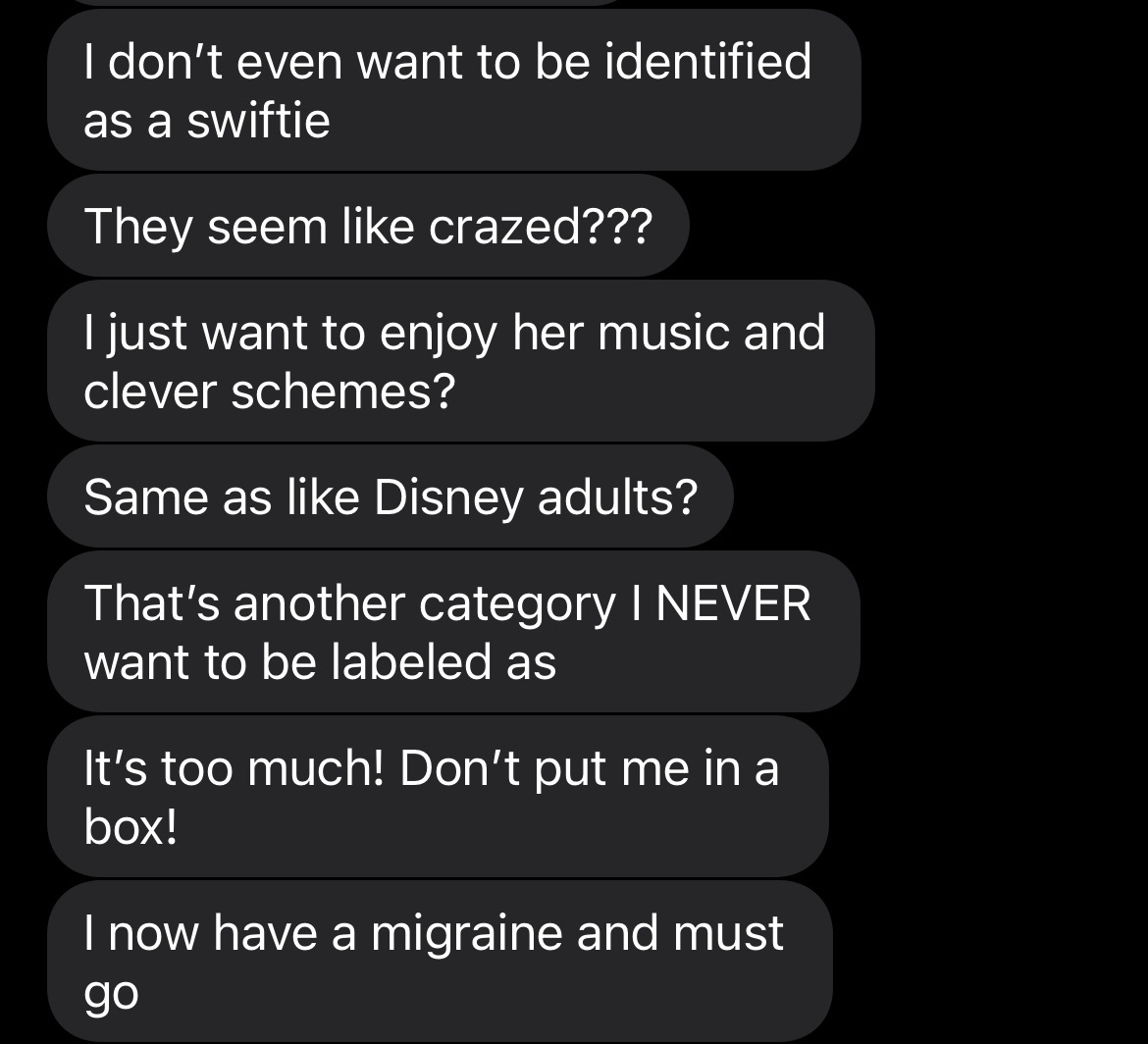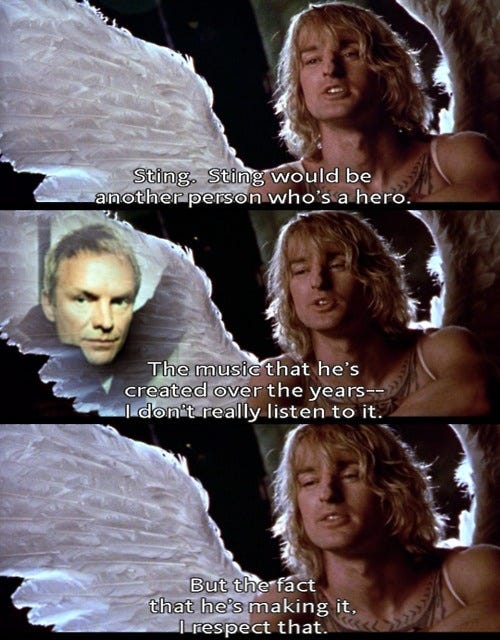Recently, instead of doing something creative and fulfilling, I decided to get into fights with people in the comment section of an article defending Taylor Swift. How did I get here?
I do not identify as a Swiftie. I remember when “Our Song” came out when I was in high school. I found the song incredibly irritating. I did not like country music. I had no interest in Taylor Swift. This lack of interest continued for many years.
I admit to liking a few bangers along the way. I love “Wildest Dreams.” Have you seen the music video? Clint Eastwood’s son is so good-looking it hurts! I added “I Knew You Were Trouble” and “Are You Ready For It?” to my Spotify running playlists. But my lack of interest in Swift remained steady until 2020.
During lockdown, my friend sent me “Invisible Sting” because she thought I’d like it. I did indeed! I listened to the entire “folklore” album and was hooked! I watched the Netflix documentary, “Folklore: The Long Pond Studio Sessions” and “Miss Americana.” To be fair, there was not a lot else to do. When she released “evermore” a few months later, I couldn’t wait to listen.
I still don’t think this makes me a Swiftie. Even my friends who I would call Swifties, balk at the name. Swiftie implies someone deranged. But I suppose getting into protracted debates about the merits of her songwriting with strangers is not far from deranged behavior.

A writer that I enjoy,
, wrote an article titled, “Am I not a Swiftie because I was fat?” which bothered me. She argues that because she was overweight and uncool growing up, she could not relate to, and therefore did not enjoy Swift’s music. This is an interesting take because Swift is notoriously open about being unpopular and many of her songs are about feeling left out.More importantly, I think the argument of “I don’t relate to these lyrics, therefore I don’t like the music” is flawed. For instance, the man of the hour, Usher, was huge when I was growing up. Do I relate to a single word that Usher has ever sung about? You bet your ass I don’t! Did that stop me from loving his music? Absolutely not.
My husband informed me the other day that in his banger, “Yeah!,” when he sings “Up in the club with my homies, trying to get a lil' V-I, Keep it down on the low-key (low-key)” that “V-I” stands for vaginal intercourse. What a treat it is to know that I sang that lyric repeatedly in 7th grade! Am I not an Usher fan because I don’t seek out V-I or make love in clubs? No, because that argument is bogus.
I chose to enter the chat by parroting back one of my favorite writers (and bonafide Swiftie), Taffy Brodesser-Akner, who Jamison quoted many times in her article. Brodesser-Akner appeared on the NYT’s podcast, “The Daily” and spoke with host, Michael Barbaro about Swift.
Barbaro agrees with Brodesser-Akner and states: “What you have clearly just demonstrated is that the Taylor Swift project of internalizing pain and turning it into music has the effect that you're describing on tens of millions of people. It makes them see anew, a lot of the pain in their lives to look at squarely in the face and to try to better understand it and to have a catharsis around it.” The magic of Swift is her ability to reflect on her life and make meaning out of her past.
My (admittedly long) comment was met with the following comment:
“That person’s ginormous comment here (I’m not even gonna reply to them) is exactly what’s problematic w her fan base- you can’t share your own experience and digestion of her music without a finger wagged in your face about why ur wrong. Crazy lol.”
I take great offense to this! This is why no one wants to be called a Swiftie! My dissent is not about blindly following whatever Swift says as gospel. In fact, I think you can remove Swift from the equation entirely and we could still have this debate!
Good storytelling isn’t about being universally relatable! How sad and bland would the world be if that was the criteria?
This internet fight reminded me of Yellowface by R.F. Kuang. After I listed Kuang’s book as one of my favorites of 2023, a friend sent me an excellent podcast episode where she was interviewed. (Note: nothing makes me more elated than when someone 1) reads my blog 2) reads a book I suggested on my blog 3) shares a podcast discussing said book - it’s truly the absolute best!!)
It’s worth listening to the whole episode but Kuang comes on at the 34:22 minute mark. Some highlights include:
“It gets to this weird and very shallow and I think ill-considered way we think about race and Publishing and storytelling which is just that oh there is something virtuous or particular from coming from a certain standpoint and we ought to celebrate that in and of itself rather than considering the author's background and identity as part of a whole matrix of things that affects how successful the text is or why we ought to read it.
So I've been getting more and more frustrated with being pitched as an Asian-American writer or a Chinese American writer as opposed to just a writer who tells interesting stories who you should read because they're interesting stories and not because it's Asian-American Pacific Islander heritage month and you're trying to fill up fill up your checkbox of you know five AAPI writers you should read to feel good about reading diversely I hate that.”
—
“You've said you feel strongly that authors shouldn't be told what they can and can't write B on their identitym why do you feel that way”
Kuang: “I think it's the wrong question to ask or the wrong way to approach this topic…
The first question that I think always gets ignored in conversations about diversity and publishing and who gets to write what is how good is the text? There's a really big difference between a well researched well-intentioned critical nuanced approach towards a history that somebody might not have a personal relationship to…
The second question is who are publishers giving money to? Who's getting paid to write these stories? This is a question about the industry and about what kinds of faces and voices that people in acquisitions meetings find profitable or attractive to American reading audience.
And that's very worth prodding and pushing to figure out whether we're just publishing the same sorts of faces over and over again because that is the assumed face that will sell well or if there are other authors and voices that we ought to be highlighting. And neither of these has anything or can be boiled down to the very silly question I think of oh does this author's racial identity qualify him to write about this? I think that gets us nowhere.”
I am not denying that Swift benefits from her whiteness and the fact that she sells. This has benefitted her. I wrote a follow-up comment asking “Can you name a few songwriters (female or male!) who are as prolific as her and write all of their own music?” This was an ill-advised question to ask the internet! A woman came for me immediately and said:
“Kendall. I am begging you to step out of your bubble and do some research. Nina Simone. Billie Holiday. Kate Bush. Joni Mitchell. Dolly fucking Parton. (I Will Always Love You!!!) Loretta Lynn. Stevie Knicks. Christine McVie. Carole King. I think you would grow in amazing ways if you widened your view of the world.”
I checked my notifications on a Saturday and this comment ruined my day. I felt like such a buffoon. But instead of admitting defeat, I doubled down and said “I was trying to get at more contemporary artists/peers of Swift” and was met with another long list of my ineptitudes:
“I can name multiple people in her peer group that write their own music. Ry X, Lainey Wilson, Jorja Smith, Goldie Boutillier, Sia, Adele, Yebba, Matilda Mann, and on and on. I think people should be allowed to like what they like. I also think people should be allowed to not connect, not relate, not understand the appeal of Taylor Swift. Music choices are so personal. I don't relate at all to Taylor's music. I also didn't grow up in white culture and it seems super foreign to me. Different strokes, different folks.”
But my argument remains: you don’t have to grow up with white culture to enjoy Swift’s music. I believe this is related to the point that Kuang is making: anyone can tell stories. You don’t have to like the stories! But to claim you don’t like the stories because you don’t relate to them is a weak reason. There are so many wonderful things that I don’t relate to that I enjoy! Just say you don’t like her music. Full stop!
ALSO: Did any of the artists listed above make 10 albums by the time they were 32? (With #11 on the way at age 34)? I can’t say for sure but I don’t think Fleetwood Mac’s keyboardist is comparable to Swift!!! You absolutely cannot deny that Swift is a prolific creator.
Like I said, I didn't like Swift until 2020/folklore - this was a mass adoption inflection point for her (IMO, since this is when I started enjoying her music).
discusses this in her "Why Are We So Obsessed with Taylor + Travis?" episode of about how many found her cringe in high school. It wasn't mainstream to like her then, as it is now. AHP breaks down why Taylor became the chosen one. I think it was because she was so prolific during the pandemic and people who were not previously listening to her music started to engage.Like her or hate her, I truly don’t care! Just don’t write an article claiming that the reason you dislike her is because you don’t look like her (very few people do).





Well put, same goes for all artists…I definitely don’t look like any of them, can’t relate to most but still love so many. Also, I’m grossed out by learning about the V-I reference. I had no idea and kinda wish I never knew. 🙄
As for Swift, haters gonna hate. Bravo to her for all of her success!